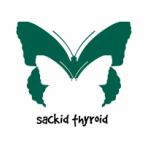Hashitomicosis (Htx) is a transient hyperthyroidism caused by inflammation. It is a hyper phase of Hashimoto's Thyroiditis and is usually associated with Hashimoto's Thyroiditis which causes an excess release of the thyroid hormone. Hashitomicosis symptoms include weight loss, fatigue, hair loss, and even weakness. This disease sometimes may go away but in most cases it never does. Treatment includes a low dose of Methimazole but usually the patient is tested for TSI. This test testes the patient for symptoms of graves disease and toxic multinodular goiter. Normal tests are less than 130% basal activity but some can run higher than this percentage. The most common result is graves disease and a very rare result is Hashitomicosis. To read more click on the links below:
https://www.nlm.nih.gov/medlineplus/ency/article/003685.htm
Here is an interesting video blog where a woman talks in first person about her life with Hashimoto's Thyroiditis and Hashitomicosis:
https://youtu.be/Lp6RravYnLY
Spanish Translation
Hashitomicosis (Htx) es un hipertiroidismo transitorio causado por la inflamación. Es una fase hiper de tiroiditis de Hashimoto y está asociada con tiroiditis de Hashimoto que causa una liberación excesiva de la hormona tiroidea. Hashitomicosis los síntomas incluyen pérdida de peso, fatiga, pérdida de cabello y debilidad incluso. Esta enfermedad a veces puede desaparecer pero en la mayoría de los casos lo no hace nunca. El tratamiento incluye una dosis baja de metimazol pero generalmente el paciente es la prueba de TSI. Esta prueba los testículos del paciente para los síntomas del bocio multinodular enfermedades y tóxicos de los sepulcros. Las pruebas normales son menos de actividad basal de 130%, pero algunos pueden funcionar superiores a este porcentaje. El resultado más común es la enfermedad de graves y un resultado muy raro es Hashitomicosis. Para leer más haga click en los siguientes enlaces:
https://www.nlm.nih.gov/medlineplus/ency/article/003685.htm
Aquí es un interesante blog video donde una mujer habla en primera persona su vida con tiroiditis de Hashimoto y Hashitomicosis:
https://youtu.be/Lp6RravYnLY
https://www.nlm.nih.gov/medlineplus/ency/article/003685.htm
Here is an interesting video blog where a woman talks in first person about her life with Hashimoto's Thyroiditis and Hashitomicosis:
https://youtu.be/Lp6RravYnLY
Spanish Translation
Hashitomicosis (Htx) es un hipertiroidismo transitorio causado por la inflamación. Es una fase hiper de tiroiditis de Hashimoto y está asociada con tiroiditis de Hashimoto que causa una liberación excesiva de la hormona tiroidea. Hashitomicosis los síntomas incluyen pérdida de peso, fatiga, pérdida de cabello y debilidad incluso. Esta enfermedad a veces puede desaparecer pero en la mayoría de los casos lo no hace nunca. El tratamiento incluye una dosis baja de metimazol pero generalmente el paciente es la prueba de TSI. Esta prueba los testículos del paciente para los síntomas del bocio multinodular enfermedades y tóxicos de los sepulcros. Las pruebas normales son menos de actividad basal de 130%, pero algunos pueden funcionar superiores a este porcentaje. El resultado más común es la enfermedad de graves y un resultado muy raro es Hashitomicosis. Para leer más haga click en los siguientes enlaces:
https://www.nlm.nih.gov/medlineplus/ency/article/003685.htm
Aquí es un interesante blog video donde una mujer habla en primera persona su vida con tiroiditis de Hashimoto y Hashitomicosis:
https://youtu.be/Lp6RravYnLY

